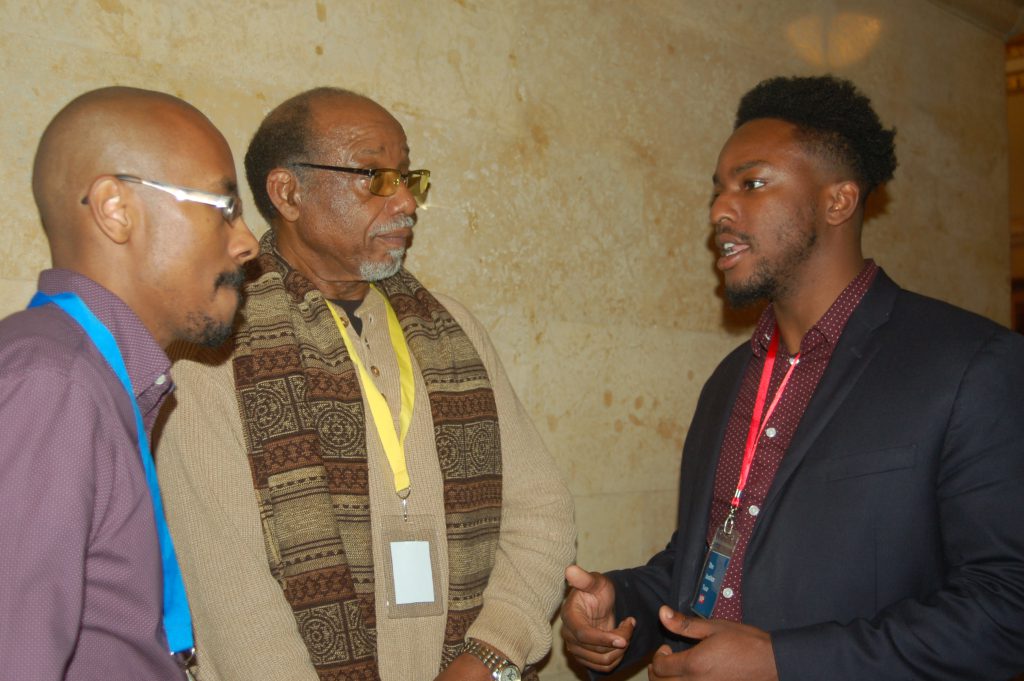ACLU Attempts to End Stop-And-Frisk Policing
While at the same time, President Trump praises stop-and-frisk policing.

Stephen Jansen (from left), Charles Collins and Caleb Roberts were plaintiffs in the ACLU lawsuit against the City of Milwaukee. Photo by Edgar Mendez/NNS.
Speaking earlier this month in Florida to law enforcement officials gathered for the International Association of Chiefs of Police conference, President Donald Trump praised stop-and-frisk policies, the legality of which has been challenged in several U.S. cities, including Milwaukee.
“[Stop-and-frisk] works, and it was meant for problems like Chicago. It was meant for it,” the president said, criticizing the agreement the city of Chicago entered into with the ACLU in 2015 to reform stop-and-frisk policies.
In Milwaukee, ACLU of Wisconsin officials are in the midst of an effort to end the practice and debunk the myth that it is a necessary and effective tool for law enforcement.
According to Jarrett English, senior field organizer for the ACLU of Wisconsin, stop-and-frisk erodes community trust and is one of the main causes of the state’s extreme racial disparities within the prison system.
“That’s why we’re working to end the practice of racialized policing in the City of Milwaukee,” English said.

Rep. David Crowley, speaking at an unrelated press conference last year, was a plaintiff in the ACLU case. Photo by Edgar Mendez/NNS.
The ACLU of Wisconsin reached a $3.4 million settlement in July as a result of a lawsuit filed against the city, the Milwaukee Police Department (MPD) and the Police and Fire Commission related to stop-and-frisk policies and the racial profiling of blacks and Latinos.
One of the plaintiffs in that case, Charles Collins, discussed the lawsuit last weekend at an ACLU event held at Centennial Hall, 733 N. 8th St. There, Collins described the impact of being repeatedly stopped and questioned by Milwaukee police.
“It’s almost like a normalization,” he said. “It’s like you already assume the police are going to stop you,” added Collins, who wore yellow-tinged glasses and a brown-and-tan vest.
Many individuals of color in Milwaukee, including State Rep. David Crowley, Stephen Jansen and Caleb Roberts, who were also plaintiffs in the lawsuit, have been stopped by police for no apparent reason.
“We got pulled over, the doors were opened, flashlights shining and guns being pointed,” said Roberts, who was giving his cousins and friends a ride home after a concert at Summerfest. After a license check and search by police, Roberts was allowed to drive away. He said police never explained why he was stopped. “As we drove off, they pulled over someone else,” Roberts added.
According to Karyn Rotker, senior staff attorney for ACLU of Wisconsin, stop-and-frisk policies became reinvigorated in Milwaukee under former police chief Edward Flynn, who resigned in January.
“He brought in a deliberate and indiscriminate stop-and-frisk policy,” Rotker said.
Flynn’s policy on stop-and-frisk, in addition to data collected as part of the ACLU’s 2013 report, “The War on Marijuana in Black and White,” drew the ACLU’s attention to Milwaukee’s large disparities in arrest rates not just for marijuana possession, but also for other non-violent crimes.
“Disparities in arrests in Milwaukee jumped off the page,” said Jason D. Williamson, deputy director of the ACLU Criminal Law Reform Project.
The process led to a lawsuit and a series of changes to MPD stop-and-frisk policies, new data collection protocols and fulfillment of other community demands.
The organization has since been working to inform the community about the impact of the lawsuit in Milwaukee and the significant reforms aimed at eliminating stop-and-frisk without reasonable suspicion, or based on race or ethnicity, according to Molly Collins, advocacy director for the ACLU of Wisconsin.
“If the community doesn’t know that these changes are supposed to be taking place, they won’t be able to hold the police accountable to these new standards. We want to make sure the people most likely to be stopped and searched know their rights, and know how to file a complaint about the way they were treated if they need to,” she said.
Those in the city who believe they have been mistreated should file a report with the Milwaukee Fire and Police Commission or contact the ACLU, NAACP or Voces De La Frontera for assistance in filing, added Collins.
In addition to improving the process of filing a complaint against police, reforms also include improved training and supervision of officers who conduct stops; collection of more thorough data related to police stops; identification and correction of stops deemed unlawful; and creation of a community advisory board that meets regularly with MPD and the Police and Fire Commission, according to the ACLU.
Data collected by MPD related to stop-and-frisk is also now evaluated by an independent consultant and the ACLU to ensure that progress is being made in implementing the reforms and identifying unlawful stops.
Police Chief Alfonso Morales has been proactive in responding to the lawsuit and also starting the process of training officers and reforming Flynn’s policies, acknowledged English.
But, in a city with a “history of police brutality and injustice, trust needs to be earned and verified perpetually afterward,” English said.
This story was originally published by Milwaukee Neighborhood News Service, where you can find other stories reporting on eighteen city neighborhoods in Milwaukee.
More about the Stop-and-Frisk Lawsuit
- Police Haven’t Ended Stop and Frisks - Isiah Holmes - May 4th, 2021
- City Hall: Mixed Results on ACLU Settlement Compliance - Jeramey Jannene - Mar 26th, 2020
- City Hall: Committee Demands Stop-and-Frisk Plan - Gretchen Schuldt - Mar 2nd, 2020
- Mayor Tom Barrett released the following statement regarding the ACLU lawsuit report: - Mayor Tom Barrett - Feb 20th, 2020
- 38% of Police Stops Not Fully Documented - Alana Watson - Feb 19th, 2020
- Morales Blames ACLU Suit for Traffic Ticket Drop - Gretchen Schuldt - Nov 18th, 2019
- City Hall: MPD Complying With ACLU Settlement - Jeramey Jannene - Apr 5th, 2019
- ACLU Attempts to End Stop-And-Frisk Policing - Edgar Mendez - Oct 18th, 2018
- Court Watch: 16 Court Reforms of Police Department - Gretchen Schuldt - Aug 14th, 2018
- Will Settlement Change Police Practices? - Andrea Waxman - Jul 25th, 2018
Read more about Stop-and-Frisk Lawsuit here
Political Contributions Tracker
Displaying political contributions between people mentioned in this story. Learn more.
- May 31, 2016 - David Crowley received $10 from Jarrett English
- September 20, 2015 - David Crowley received $50 from Molly Collins





















I agree with Jarrett English’s comment regarding the compliance of the FPC, MPD Chief Morales and the City of Milwaukee with regards to the ACLU Settlement Agreement and Court Order: “…trust needs to be earned and verified perpetually afterwards”.
The MPD has a huge technical challenge ahead to update and tie together its Computer Aided Dispatch (CAD), Traffic and Criminal Software (TracCS), Records Management System (RMS), Administrative Investigative Management System (AIM) and Video Records System so that data captured across these systems can be correlated per the requirements of the Settlement. Major changes are also required in Training, Supervision, Complaints and other areas. Please review the Settlement Agreement https://www.aclu.org/legal-document/settlement-agreement-executed-parties. Despite repeated requests to the MPD and the FPC for the MPD to produce a Project Plan including Timelines, Dependencies, Staffing and Budget — what you would normally see in any private sector entity tackling an effort of this magnitude — no acknowledgement of even the need for a Project Plan has been forthcoming from the FPC or the MPD.
If you think I’m just being paranoid about the need for a Project Plan, consider that the MPD has been unable to provide Uniform Crime Reporting (UCR) data to the Common Council Alders or the FBI since at least July of this year because of problems with their CAD system. The first legally binding deadline imposed by the Settlement Agreement and Court Order to update 7 MPD Standard Operating Procedures is TODAY, October 21, 2018, and the FPC’s Policies and Standards Committee, which must meet and review the SOP changes before they can be presented to the full Board of FPC Commissioners, does not even have a meeting scheduled to begin reviewing these SOP changes.
Mr. Mendez reports that: “Data collected by MPD related to stop-and-frisk is also now evaluated by an independent consultant and the ACLU to ensure that progress is being made in implementing the reforms and identifying unlawful stops.” That is not correct. It is not “now evaluated”, this is one of the goals of the Settlement Agreement, but the contract with the consultant, Crime & Justice Institute http://www.crj.org/contact-us/ was just recently signed and it is premature, to say the least, that it is “now evaluated”.
Mr. Mendez mentions the “creation of a community advisory board”. I think he is referring to the Milwaukee Collaborative Community Committee https://city.milwaukee.gov/mkecr, which conducted over 20 “hubs” to solicit feedback from the community regarding the draft report of the DOJ’s assessment of the MPD and the FPC. They were funded by the Common Council with $100,000 in 2018 and are currently working to analyze and publish their findings. As of now, there is no money allocated for the continuance of the Milwaukee Collaborative Community Committee in the Mayor’s 2019 budget. I have been told that money will be made available from a contingency fund. Since the participation of the Milwaukee Collaborative Community Committee was specifically called out in the Settlement Agreement, I think it should be funded explicitly by the Common Council and I hope a budget amendment will be submitted for that purpose.
Regarding the FPC’s role in this, I am concerned because they, along with Chief Morales and the City of Milwaukee, are defendants in ACLU lawsuit. So how much transparency can we expect from any of them? Again, I would like to see “The Plan” — exactly how is the MPD going to pull this off? The FPC also has obligations along with the consultants, Crime & Justice Institute, and their plans are all contingent on the MPD accomplishing its tasks per the deadlines imposed by the Court Order. If I were dependent on another entity’s fulfillment of its obligations for me to fulfill mine, I would insist on seeing their plan.
If you have not read the “Expert Report of Samuel Walker, PH.D.“, which was part of the plaintiff’s evidence in the ACLU case, https://www.aclu.org/legal-document/expert-report-samuel-walker-phd, I highly recommend it, especially section VI. ROLE OF THE MILWAUKEE FIRE AND POLICE COMMISSION, in which he excoriates the FPC for its failure to perform its statutorily mandated duties. And what is the state of the FPC? Two of the Six current commissioners (State Law authorizes Nine Commissioners), Ann Wilson and Board Chair Marisabel Cabrera, have not been reappointed by Mayor Barrett and their terms have expired. The Common Council is locked in a battle with the Mayor on this and the most recent nomination for the FPC Board of Everett Cocroft has been repeatedly torpedoed by the Public Safety and Health Committee.
Yes, “trust needs to be earned and verified perpetually afterwards”, but repeated attempts to bring these issues to the attention of the Milwaukee Journal Sentinel and Urban Milwaukee have been ignored.